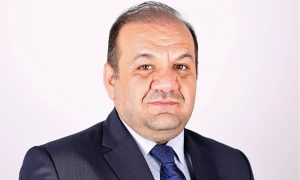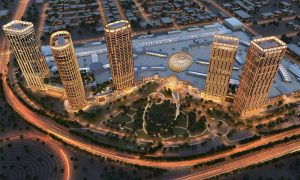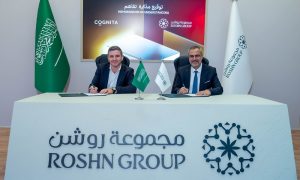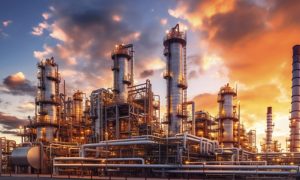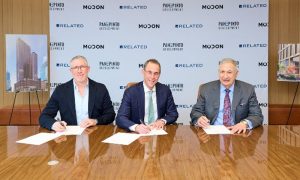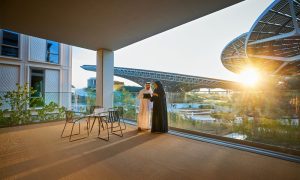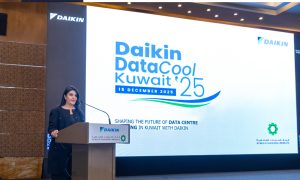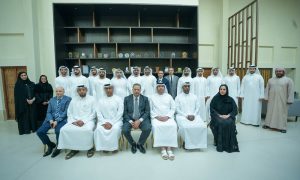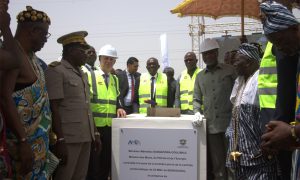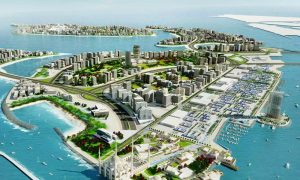The Kingdom Tower is go
In an exclusive report, CMME can reveal that work on the Kingdom Tower has begun. Bauer’s Jareer Jadallah reveals how it feels to be there at the beginning.

In an exclusive report, CMME can reveal that work on the Kingdom Tower has begun. Bauer’s Jareer Jadallah reveals how it feels to be there at the beginning.
If you didn’t know already Saudi Arabia is to build the tallest tower ever built in Jeddah. Once completed the mighty building will stand over 1 km high, overtaking the Burj Khalifa which stands at a mere 828m high.
Building big means big news and the announcement in September threw the world’s news services into overdrive as journalists and interested observers the world over scoured over the blast of information and pictures that were released with the announcement. First port of call for most was the architect firm AS+GG (a name that incorporates the lead brains of the outfit Adrian Smith and Gordon Gill).
If you are not familiar with the name you will almost certainly be familiar with the previous work of its Chicago-based architects. Gill worked on the striking Pearl River Tower in China and his partner Smith’s resume is arguably even more impressive; including Chicago’s Trump Tower, Masdar City and crucially, for the prospects of a successful completion of Kingdom Tower, Burj Khalifa.
These are superstar architects creating super structures. Dream spires designed to created awe and inspire imaginations. When Burj Khalifa was first announced in 2004 the huge step up from the previous landmark tower, Taipai 101 which stands at 509m, was so massive that people questioned if it was at all possible for man to build safely at such a height. Fast-forward six years and people were left wondering how it would be at all possible to not only exceed Burj Khalifa’s record put to smash it out of the park.
There are number of challenges to overcome when building these super-scrapers. Some are obvious some are not. Perhaps the most glaring from a construction point of view is how you defy gravity, physics and chemistry to jet concrete up to the rarified altitudes required. As is well documented, Burj Khalifa’s construction required breaking through a whole set of pre-conceptions about what was possible but Putzmeister’s concrete pumps in combination with BASF’s Glenium SKY concrete mixture took pouring literally new heights.
Some had argued that the only way to get up beyond 400m was to create a dedicated platform from which to do the pouring.
However the two companies showed you could do it all from the ground and launched/pumped the mixture up to a world record 606m. This figure will surely need to be surpassed for the Kingdom Tower but Putzmeister certainly, Schwing probably and Sany’s latest generation 72m pump (the snappily titled SY51100THB 86) is highly likely to be able to make sure that Jeddah does not become the location of the world’s highest solid concrete sock.
The less obvious restraint is the time. Building high is a highly expensive exercise. The taller your building, the longer it takes and the more exponential rise you will see in your costs. This is why buildings
like Burj Khalifa and now Kingdom Tower are multi-use complexes of residential, office and mall units. Could a tower be built higher? Well yes but it will take time. Could it be done and ever payback it’s investment. That is highly questionable.
Certainly Prince Al-Waleed bin Talal is happy to dedicate 4.6 billion Saudi Riyals to the project as long as the 3,500,000 sqm area it will inhabit makes a return in investment.
So the world’s new record holder of tallest tower needs to be built in time and on budget, and ensuring that happens will be Saudi Bin Laden Group. The multi-faceted construction giant officially took on Kingdom Tower on 1 January 2012 and, thanks to Bauer Equipment Gulf’s managing director Jareer Jadallah, we can also reveal that work is already underway on the building. He tells CMME that Zahid Tractor, Saudi Arabia’s biggest equipment dealer supplied the Bauer piling machinery to sub-contractor and SBG subisdary HUTA to start test piling.
Around 45,000m³ of concrete, weighing more than 110,000 tonnes, were poured for the foundations of Burj Khalifa with 192 piles running to a depth of over 50m. Whatever the conclusion of the test piling reveals all of those the figures will seem like a drop in the Red Sea. Although, frustratingly, for now, many of those details are carefully under wraps.
It is still early days in the testing on Kingdom Tower and some questions are yet to be answered that will be critical to those desperate to know more about the construction and the exact final height of the Tower. However, considering that we will have six years to follow the story, we will have more than enough to chew over the coming months as it begins to take shape. And Jadellah’s in the mood to get us to speed.
Bauer’s own participation was rumoured for months, particularly because it worked on Burj Khalifa (if you’re going to build a project as costly and risky as this, it makes sense that you turn to those that know how to do it and have the proven technology to do it), but Jadellah’s relieved to able to reveal its involvement thus far.
“Up until now it was not officially commissioned, but I have good news for you, and I know we teased you a lot, but I can officially say that we are now officially started on the Kingdom Tower,” he states.
“Up until now it was not officially commissioned, but I have good news for you, and I know we teased you a lot, but I can officially say that we are now officially started on the Kingdom Tower,” he states.
In hindsight, Bauer is the obvious choice not only because of Burj Khalifa but also for its other work in the Kingdom. While he is not Bauer’s man on the ground, Jadellah knows the giant from a previous role: “I know SBG well from when I used to work at Wolffkran and they are very good customers of mine. I have an excellent relationship with them.”
According to Jadellah, HUTA bought a BG40 machine from Bauer to do the test piling a number of weeks ago although he reveals that any official announcement could not be made until given approval from SBG.
“Officially SBG are of course the main contractor, and while it is a subsidiary of SBG, HUTA had to go through the tendering process like everyone else. Just because it is a subsidiary it doesn’t mean that it got the job. There were other factors like pricing, etc, to be done.”
He explains that with the Kingdom Tower being such a prestigious project it is being carefully handled to ensure that even the smallest detail is treated properly.
“Kingdom Tower is not a villa,” he jokes, then adds more seriously. “The king is involved and the government is involved.”
When we meet, Bauer’s men were assisting on site, he explains: “A team from Germany is now there; three or four guys.”
He continues: “I have worked with a lot of different companies, but I have to admit that with Bauer it is easier to get some kinds of jobs. Behind the name you have the reputation and the quality.
“Price-wise customers may go somewhere else, but quality is differnent and sometimes they don’t have a choice, especially with big and prestigious projects like these.
“Look around, you have Burj Al Arab, Burj Khalifa, etc, they all had Bauer machinery. If a customer does not want to fail with such big projects they come to us. They are coming to a supplier that they know 100% that he is getting the machine and the know-how.”
According to Jadellah, Bauer Equipment Gulf’s sister company Bauer International, the group’s contracting company that has worked on projects such as the recent enabling work on Deyar Al Mafraq and tunnelling work on Nation Towers in Abu Dhabi provides vital information into the development of the machinery company’s equipment.
“They came to Abu Dhabi 26 years ago and through them we are collecting the knowledge and knowhow. Effectively we are doing both sides and ‘experiencing our machines’ ourselves. They give us feedback on the machines and you don’t get that type of knowledge elsewhere.”
While it is too early to give specifics on the technology deployed on Kingdom Tower, Jadellah is happy to share his opinion that should the testing be fruitful and that piling is used [some have conjectured that the foundation could be dug using cutters] the machines wouldn’t be that different from those used on Burj Khalifa.
“Let’s say machine-wise it could be the same,” he says, “but obviously we would modify the machines as the foundation would have to be deeper than Burj Khalifa [a figure of 80m is the speculated estimate].”
Any alterations to the machines will be done in Germany, and the former crane-man says that like company’s such as Wolffkran, Bauer is lucky to be able to utilise the brain-fund back in Europe.
“I was the one that closed the deal for the 45 cranes in Mekkah Clock Tower (project) and the customer came to Wolff because he wanted the Rolls-Royce of cranes, the very best and we could get engineers there on site from Germany. And likewise with Bauer, you can say that Germany has the best industrial solutions worldwide.
“I am a Palestinian but I lived in Germany for 25 years and I tell my customers that you will pay more, but they will never let you down. You can rely on them. I always tell my sales people we are working for the premium suppliers. Service is from day one to the last day, when you talk to the customer with the technical knowledge we have we are able to educate and explain to them why we are the premium company.”
“I am a Palestinian but I lived in Germany for 25 years and I tell my customers that you will pay more, but they will never let you down. You can rely on them. I always tell my sales people we are working for the premium suppliers. Service is from day one to the last day, when you talk to the customer with the technical knowledge we have we are able to educate and explain to them why we are the premium company.”
He then reflects: “But sometimes the customer is more price conscious and we have to convince them. My own technical knowledge may be relatively small but I can take a team from Bauer who work 24 hours to find the right solution. They call it the foundation technology department and they talk directly.”
While it works with Zahid Tractor in Saudi, elsewhere the company is selling direct to customers. He explains that Bauer International’s almost three-decade presence in the region means that in the UAE, Qatar and others, it will not be moving to a dealer/distributor arrangement any time soon.
“Bauer International has a long list of customers now and many of them have ten Bauer machines. It helps that Bauer International got here first and people wanted to copy their success. We have a strong market share of 55% in the UAE. It used to be higher but through globalisation and the downturn a lot of customers and machines have left the market.”
While its machines remain in widespread use and, through Bauer International, have seen decades of service in the market, a physical office arrived relatively late in 2005. However in terms of what was happening in the UAE at the time, the timing proved to be ideal.
“If you look at the Wolfkrann’s, Liebherr’s and Potain (with NFT), they came at the right time. At the beginning of the boom. And so it was with us, the brand was already relied upon.”
The subsequent slump in the UAE has left an effect on many companies in the sector and Bauer is no exception but Jadellah reveals that the company is determined to grow, and is moving to bigger premises and yard and adding to its workforce.
“Theoretically we should be losing people but we are doing the opposite to stay ahead. But to you have to be flexible and you have to be creative. If you want to be number one in the market you have to be clever.”
While he won’t go as far as saying that Bauer will follow others down the rental route, he won’t rule it out, “we are studying the model, and we are considering investing in second-hand and trade-in machines.
“You have to realise that the market is quite saturated, there are 400 machines in the market. Prices are coming down, so of course fewer customers are willing to spend on a $1 million machine. Our customers are spreading the businesses, they are going to Iraq [Bauer Group won the $1.9 billion contract to build the Mosul Dam in November], they are going to Jordan, so we also need a very good aftersales service. We are working to be in every corner.”
One market that is certainly on the radar is Qatar. He argues that soil conditions there are so tough that he sees few other companies capable of delivering what will be required other than Bauer.
“We are already established in the market and running. We are keeping an eye on what’s going on, but of course we cannot wait for the market to get running too. It’s a risky business being the biggest market leader. Going up is always easy but staying up is the challenge.”


